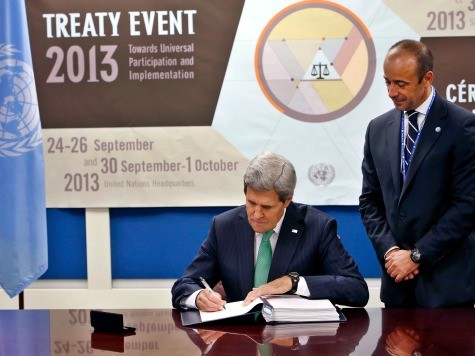In October 2009, President Obama reversed the policies of both President Bill Clinton and President George W. Bush by committing the United States to U.N. Arms Trade Treaty (ATT) negotiations. In the years that followed, the Senate made it clear to the president on numerous occasions that it will not ratify any arms treaty that does not secure our country’s sovereignty and protect our citizens’ individual freedoms.
These issues have not been resolved. Yet, in October 2013, the Obama Administration signed the U.N. ATT in a direct dismissal of the American people and the bipartisan Senate majority that rejects this treaty.
Even though the treaty will never be ratified by the Senate, the fact that the administration signed the treaty in the face of such strong opposition by Congress gives us little faith they will not try to implement the Arms Trade Treaty in the absence of ratification. That is why in January, the Senate and House passed legislation which includes specific language prohibiting any funding of the U.N. Arms Trade treaty unless it is ratified by the U.S. Senate.
Throughout this process, it has been disturbing to watch the Administration reverse U.S. policies, abandon its own negotiation principles, admit publicly the treaty’s dangerous ambiguity, and hastily review the final treaty text.
After signing the treaty, Secretary Kerry stated,”This treaty will not diminish anyone’s freedom” and claimed that it “reaffirms the sovereign right of each country to decide for itself… how to deal with the conventional arms that are exclusively used within its borders.” While the treaty does include a preamble referencing lawful firearm ownership, it is not binding, and the treaty itself does not recognize the ownership and use of firearms or individual self-defense as fundamental rights.
Secretary Kerry says this treaty is about “keeping weapons out of the hands of terrorists and rogue actors.” However, North Korea, Syria, and Iran – who most would agree are “rogue actors” – voted against the ATT. If 50 nations ratify the treaty it will take effect, but those rogue actors will not be a party to it and will not follow its provisions, leaving them free to continue dealing in arms. Meanwhile, the United States could find itself handcuffed when it comes to aiding our most vulnerable allies – including Israel, Taiwan, and South Korea – due to international pressure exerted under the guise of the Arms Trade Treaty.
Additionally, the export of firearms from the United States is already subject to a very strict and complex set of guidelines. The U.S. International Trade in Arms Regulations, which were written in accordance with the Arms Export Control Act, strictly limits the transfer or sale of firearms and has been doing so since the 1950s. Other nations, primarily our allies, have followed our lead, mirroring our controls because they are so comprehensive. Like gun control laws, even with the Arms Trade Treaty, bad actors will continue to act accordingly.
If the ATT could work, it would not be necessary. There is no reason to believe the ATT will succeed where past U.N. Security Council Arms Embargoes have failed. Smothering the world with law will not affect nations who choose not to respect the treaty or are too ill-governed to enforce it.
In fact, the State Department itself has described the goals of the treaty as “ambiguous,” hardly instilling confidence that American rights will be secure. Good treaties are not ambiguous, and our constitutional rights are too important to be entrusted to a dangerous treaty drafted by nations hostile to the ownership of firearms by private citizens.
That is why Congress stands in firm opposition to the treaty’s ratification. Just in case with this Administration that is not enough, the passage of language prohibiting any funding of the enactment of the treaty has made it unequivocally clear that Congress is committed to upholding the fundamental individual rights of Americans and rejects the U.N. ATT. We will not be bound by the treaty and we will not fund its implementation.

COMMENTS
Please let us know if you're having issues with commenting.